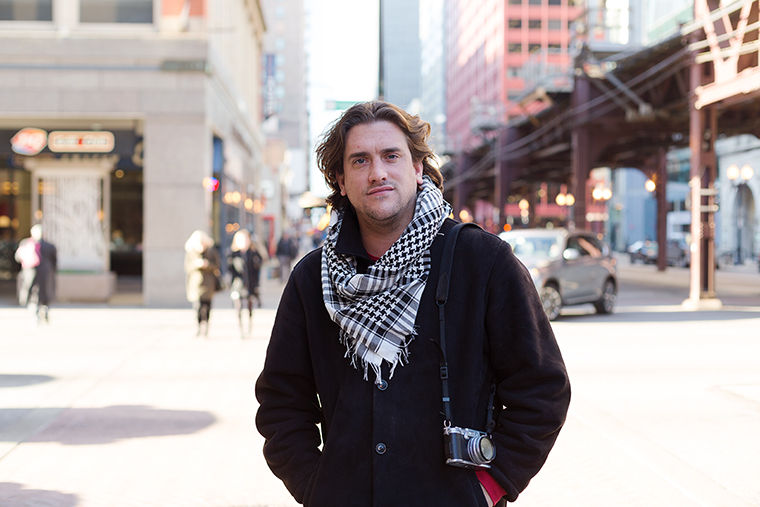Photojournalism: From protests to war zones
Senior journalism major Alex Wroblewski is scheduled to meet with President Barack Obama on April 18 after winning the 2016 “Eyes of History” photography contest.
April 18, 2016
Senior journalism major Alex Wroblewski was in Madison, Wisconsin, doing homework, when he got a call from the White House announcing he had been named Student Photographer of the Year. He had won first place in the “Eyes of History” contest, a multimedia and photography contest organized by the White House News Photographers Association.
Persuaded to enter the competition by a friend when covering the Iowa caucuses, Wroblewski, a freelance photojournalist based in Chicago, submitted his portfolio including black-and-white images depicting gun violence in Chicago, the 2014 Ferguson protests and his Iraq coverage.
Wroblewski, whose work has been published by The New York Times, The Wall Street Journal and CNN, is scheduled to meet with President Barack Obama on April 18.
But Wroblewski was not always interested in journalism. When 25-years-old, he was a full-time truck driver. During this time, he would listen to National Public Radio all day, which piqued his interest in politics and the conflicts in Syria and Iraq.
After he graduates in May, Wroblewski will work full-time as a photography intern for The New York Times during the summer.
The Chronicle spoke with Wroblewski about his passion for photojournalism, his fears when covering war zones and why he chose to cover Ferguson and Iraq.
THE CHRONICLE: How did you get into the photojournalism field?
ALEX WROBLESKI: I grew up skateboarding and used to make skateboarding videos and take pictures. I took a photography class, and the teacher was a journalist. After that class, I went back to Wisconsin, and the local newspaper, The Milwaukee Journal Sentinel, started giving me assignments, mostly shooting concerts. They started giving me other assignments and I started listening to the radio, reading newspapers and kind of fell into it by accident.
What went into covering Ferguson and Iraq, and how did you cover your expenses during these trips?
Initially, I’m paying for myself to go to these places, and then I make the money back. With Ferguson, I drove down there, started [photographing and] tweeting photos. That is how editors were like ‘Hey, we want to buy these.’ With Iraq, [it was the] same thing—tweeting [and] letting people know I was out there.
Why did you decide to visit Ferguson during the 2014 protests?
I went there the day after Al Jazeera journalists were tear gassed by the police. It was a five-hour drive. I was actually shooting on assignment that day, and my friend said, “Do you want to go? I’ll pay for gas.” I said, “It is five hours away. Why not?” That was two days after Mike Brown was killed. I got there a little earlier than some of the other [journalists]. It was a good experience.
Why did you go to Iraq?
A mentor of mine was able to introduce me to some Iraqi journalists she used to work with, and they were planning an embed trip [where] you work with the military, and they take care of you; you eat with them, sleep with them, etc. They were about to take the city of Tikrit. [The soldiers were] about to reclaim the city from ISIS so they wanted a journalist there.
Do you have any fears when covering war zones?
There are snipers and [Improvised Explosive Devices]; those are a real threat. [Iraq] is a tough country to work in. There were multiple times when I was worried about if I was going to make it out safely.
Who has helped you the most at Columbia?
[Journalism assistant professor]Jackie Spinner has by far been invaluable as far as my career goals. Jackie is really unique because she is a great reporter; she wrote a great book [about war reporting]; she was at The Washington Post for about 15 years, but besides the writing standpoint, she is a big advocate for photojournalism, what photographs can do and how they still are relevant and perhaps more important than ever these days. She is a real champion of pure photojournalism for a lot of journalists and reporters.
Do you have any advice for journalism students?
Working on stories that are personally important to you is invaluable. That way you, are motivated, and you have a personal connection, [and] you want to keep pursuing the story. Having your own project that is important to you keeps [journalism] fresh and reminds you why you want to do journalism in the first place.








